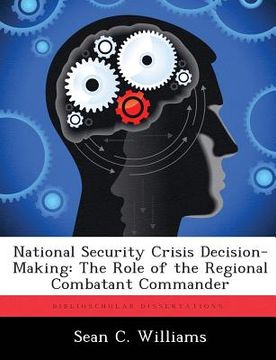Share
National Security Crisis Decision-Making: The Role of the Regional Combatant Commander (in English)
Sean C. Williams
(Author)
·
Biblioscholar
· Paperback
National Security Crisis Decision-Making: The Role of the Regional Combatant Commander (in English) - Williams, Sean C.
$ 48.80
$ 57.95
You save: $ 9.15
Choose the list to add your product or create one New List
✓ Product added successfully to the Wishlist.
Go to My WishlistsIt will be shipped from our warehouse between
Monday, July 01 and
Tuesday, July 02.
You will receive it anywhere in United States between 1 and 3 business days after shipment.
Synopsis "National Security Crisis Decision-Making: The Role of the Regional Combatant Commander (in English)"
The successful management of the Cuban Missile Crisis of 1962 set an unfortunate precedent for crisis management and national security crisis decision-making that persists into the contemporary security environment. The Cold War norm, roughly translated, meant that crisis management equaled crisis mitigation. The problem today is that the security environment has changed. Crisis management in the new environment should consider the use of crisis conditions to further the nation's security interests. The US has implemented formal changes to the structure of national security decision-making. Through the Goldwater-Nichols Department of Defense Reorganization Act of 1986 (GNA), the Congress sought to reorganize the defense establishment to provide for better military advice to civilian leaders and also to enable better operational execution during complex and fast-moving national security contingencies. The GNA expanded the authority of the regional combatant commanders (CCDR) and charged the CCDRs with the maintenance of security in their region. Finally, the informal roles and relationships between the civilian and uniformed leadership that change with new presidential administrations often influence the decision-making process and policy formulation. Despite these changes, few scholars or policy makers have considered the role of the CCDR during complex contingencies. To discern a new norm for crisis decision-making and civil-military interaction, the study considered all of these changes. An initial examination of the existing crisis and crisis management definitions made it possible to project the new requirements for the contemporary security environment. Subsequent analysis of the CCDR's formal role in the decision-making process and a critical review of three recent military interventions (Operations DESERT SHIELD/DESERT STORM, ALLIED FORCE, and ENDURING FREEDOM) enabled a comparison of actual crisis behavior with the predefined crisis management norms and the
- 0% (0)
- 0% (0)
- 0% (0)
- 0% (0)
- 0% (0)
All books in our catalog are Original.
The book is written in English.
The binding of this edition is Paperback.
✓ Producto agregado correctamente al carro, Ir a Pagar.

